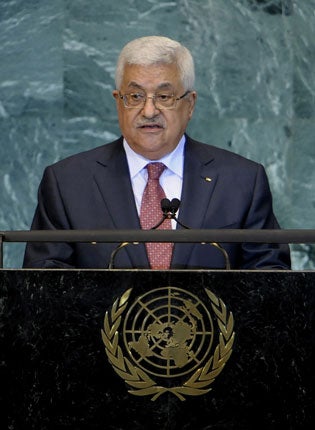Palestinians give US mission a week to save peace talks as settlement building resumes

Your support helps us to tell the story
From reproductive rights to climate change to Big Tech, The Independent is on the ground when the story is developing. Whether it's investigating the financials of Elon Musk's pro-Trump PAC or producing our latest documentary, 'The A Word', which shines a light on the American women fighting for reproductive rights, we know how important it is to parse out the facts from the messaging.
At such a critical moment in US history, we need reporters on the ground. Your donation allows us to keep sending journalists to speak to both sides of the story.
The Independent is trusted by Americans across the entire political spectrum. And unlike many other quality news outlets, we choose not to lock Americans out of our reporting and analysis with paywalls. We believe quality journalism should be available to everyone, paid for by those who can afford it.
Your support makes all the difference.A fresh US-led diplomatic effort was under way yesterday to rescue Israeli-Palestinian negotiations as construction resumed in some Jewish West Bank settlements after Israel's decision to end a 10-month moratorium on building. Palestinian President Mahmoud Abbas effectively gave US mediators at least a week to resolve the crisis by confirming that he would hold a series of consultations, culminating in an Arab League meeting called for next Monday, before deciding whether to pull out of the negotiations.
Speaking after meeting French President Nicolas Sarkozy in Paris, Mr Abbas told reporters: "We will not have any quick reactions. After this chain of meetings, we will be able to put out a position that clarifies the Palestinian and Arab opinion on this issue now that Israel has refused to freeze settlements."
US Presidential envoy George Mitchell will fly to the region this week in the hope of salvaging the talks, which Mr Abbas had earlier threatened to break off without an extension to the partial construction freeze. US State Department spokesman PJ Crowley acknowledged that Washington was "disappointed" by Israel's decision to halt the moratorium and said there were no Israeli-Palestinian negotiations "scheduled at this point". But he said the administration would be "in touch with the parties to see how we move ahead".
Work resumed in at least three settlements yesterday. In Adam, north of Jerusalem, a bulldozer cleared ground at a site earmarked for new housing while a single bulldozer flattened earth at another at Karme Tzur in the southern West Bank. In the large northern West Bank settlement of Ariel four construction vehicles began levelling rock and bushes on a plot planned for 100 new homes.
But the resumption was limited across the West Bank, not least because of the end of the partial freeze fell in the middle of the week-long Sukkot religious holiday in which many businesses are only partly functioning. Ironically, Palestinian building workers employed in settlement sites are in many cases unable to go to work because of the temporary closure of crossings ordered by the Israeli military during the holiday.
The significance of the 22-member Arab League meeting fixed for next Monday is that it will be with the same representatives of Arab states who in July voted to give Mr Abbas the backing to enter negotiations if and when he chose. Besides further weakening Mr Abbas's position, the Israeli Prime Minister's decision to halt the moratorium is another setback for the Middle East peace efforts of US President Barack Obama, who issued a high-profile call on Israel to prolong the freeze in his speech to the UN general assembly in New York last week.
Officials on all sides have been tight-lipped about details of the behind-the-scenes diplomatic efforts to salvage the talks. But Associated Press reported yesterday that Israeli Defence Minister Ehud Barak had proposed that he should have veto powers on each settlement building project. It was unclear, however, whether that would find favour with his more hawkish cabinet colleagues who might see it as a means of restoring the freeze in all but name.
Meanwhile, Khaled Meshal, Hamas's leader, made a surprise claim that only minor issues now stood in the way of reconciliation with Mr Abbas's Fatah faction. Hamas, which controls Gaza and has considerable support in the West Bank, has been excluded from talks with Israel and has threatened to undermine them with attacks like that which killed four settlers at the start of the month.
Join our commenting forum
Join thought-provoking conversations, follow other Independent readers and see their replies
Comments